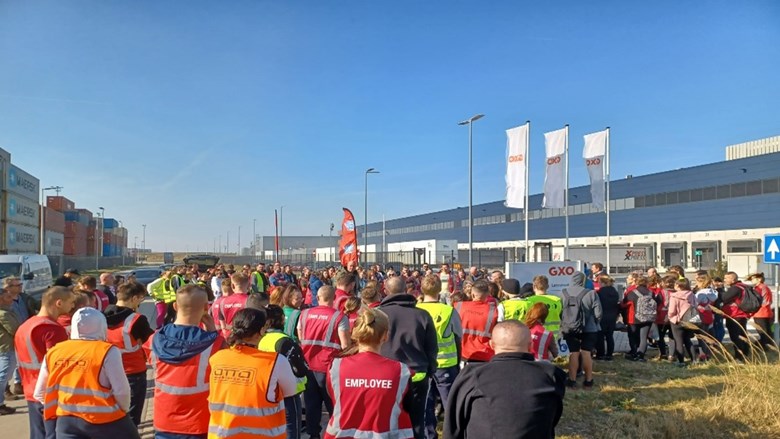Picket line at H&M warehouse
“They look at us as if we are animals in a zoo, we feel like slaves“

You don’t need to travel to Bangladesh to find harassment, unsafe working conditions and fundamental disrespect for workers’ rights in the fashion supply chain. It happens right under our noses in Tilburg (Netherlands) in the H&M warehouse, sub-contracted to GXO Logistics.

200 Workers organizing
Last week approximately 200 migrant workers turned their back to the unsafe working conditions in a H&M warehouse in Tilburg (Netherlands). In front of the warehouse a group of workers from mainly Eastern Europe organized themselves to discuss harassment, unsafe working conditions and the fundamental disrespect for workers’ that they suffer on daily basis.
Fire in the warehouse
Since last week there is a ban on mobile phones at the worksite. The ban caused a lot of turmoil and anxiety. Particularly so because it was the managements’ decision in the aftermath of a fire in the warehouse several weeks ago. After the workers informed their managers about the unsafe working conditions, having to work with their feet in fire-extinguishing water while electric wires were lying around in the warehouse, the workers were harassed, pushed to work and threatened with dismissal or other ‘consequences’ if they wouldn’t continue working. Several workers made pictures and movies with their mobile phones of the unsafe situation. It was obvious that GXO didn’t take the safety of the workers seriously and instead primarily worried about the exposure of the unsafe working condition. The workers themselves alarmed the Dutch Labour Inspectorate. Subsequently the Labour Inspectorate forwarded the pictures to GXO management who then forbade the workers to bring along their mobile phones to the worksite.
Dialogue with GXO
In the days before the picket line workers formed a union delegation to share their concerns and speak with the warehouse management about the safety issues and the ban on phones. The management did not share the workers’ concern on the unsafe working conditions, nor the harassment at the worksite. They pointed to the workers themselves: “individual migrant workers need to complain harder to their team leaders or talk to confidants (vertrouwenspersonen).“
The union delegation suggested to at least temporarily allow mobile phones on the work floor and in the meantime solve the structural safety issues. But overall the union observed that the management focusses on top-down decisions, while the consequences for the workers and their safety should be the starting point for structural solutions.
Internal company regulation & company security checks
GXO points to internal company regulation to legitimize the ban on phones. However, this regulation is often shared in a language workers don’t understand, it is not widely known among workers, nor is it properly explained.
Moreover, GXO structurally infringes their own company regulations by security visitation (security check) of their workers. Company regulations state that security checks can take place in specific individual cases when there are specific suspicions circumstances. And based on company regulations those checks can only take place in guidance with and in presence of the highest GXO staff member available. However, In the past security checks were done on all workers, without ever having GXO staff present. GXO has fully outsourced the security checks of their workers to an external security company. Workers state that they feel observed as if they were criminals on the work floor: “They look at us like animals in a zoo.“
Stolen mobile phones, GXO said they weren’t liable
Workers feel being criminalized by GXO by the constant surveillance. However, the company managers themselves state that GXO is not responsible if personal belongings from workers are stolen from company lockers that workers mandatory need to use.
Internal company regulation allows exemptions
Several workers have asked permission to take their phone to the work floor because of personal circumstances, and referred to the GXO company regulations for approval. Workers have relatives in Ukraine war zone and fear that every call might be the last. Others have urgent medical situations at home and are highly stressed if they cannot be reached. Although the internal company regulation allows exemptions managers allowed no exemptions, even in these very tragic circumstances.
Workers feel unsafe,
they need to have their phones
The situation is very clear to the warehouse workers. GXO is not primarily concerned about their safety, they just don’t want workers to carry phones because the company is scared that workers will register unsafe working conditions.
09.03.2022: H&M warehouse workers: “GXO is not a safe place, they don’t want us to make pictures of unsafe situations.“
Workers stressed that they don’t even consider taking their phones for social media or personal relaxation time. The extremely high targets, that cause a lot of stress already, don’t leave any time to do so. Workers want to take their phones simply as protection, as guarantee that it will not be stolen and so they would be reachable for emergency calls from relatives.
At the picket line
A few minutes before the picket line started company management informed the workers that temporary relaxation of the rules on mobile phones at the work floor would be authorized on individual level. However, they failed to present clear and transparent procedures.
During the action a union delegation tried to keep the dialogue with the management open and there were several conversations, unfortunately without a clear result. GXO qualified the solution of their workers to temporary allow phones on the work floor, at the same time asking GXO to safeguard the safety of the personal belongings so they wouldn’t be stolen as unreasonable and unfair demands.
The position of H&M
In 2021 several issues from the H&M warehouse in Tilburg were shared with H&M referring to their own standards on safe and fair working conditions for migrant workers in the H&M supply chain. FNV also shared with H&M the workers statements on H&M audits. GXO briefed their workers to pretend not being able to speak English and instructed them to not speak about working conditions and targets when H&M carried out audits. The trade union insights did not trigger H&M to see FNV as coalition partner in solving and preventing precarious working conditions in its supply chain.
On the issues from the picket line H&M responded in the media as underneath:
“ We are aware of the situation in Tilburg and we hope that dialog succeeds. GXO has an efficient system to remedy the concerns of its workers. We have all confident that the involved parties do all they can to have a fair, constructive and respectful dialogue and solves the issues “




